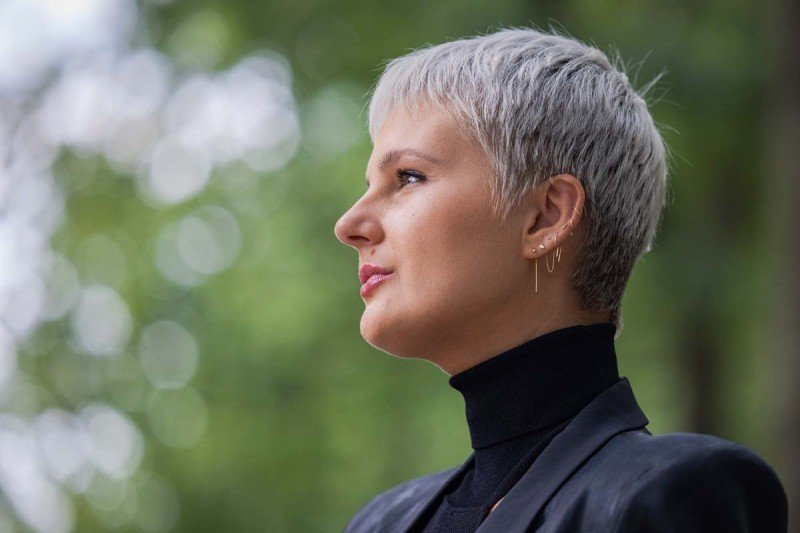
It’s the most wonderful time of the year. Except when it isn’t.
Coping with cancer is already hard. Coping with cancer during the holidays can be even more difficult, especially for teens and young adults with cancer, who are excited about developing plans for their future when the unthinkable happens.
“Many young people are focused on milestones and life transitions. For those who have cancer, the holidays can be another reminder of how cancer has impacted their ability to achieve some of those, especially compared with their peers,” says Alexandra Russo, a social worker at Memorial Sloan Kettering Cancer Center. She supports patients receiving treatment through the Lisa and Scott Stuart Center for Adolescent and Young Adult (AYA) Cancers. “They’re at a developmental stage where they’re gaining a sense of control over their life, and cancer stops that in its tracks.”
It happened to Eliza Wierzbinska, who was diagnosed with acute myeloid leukemia on her 30th birthday. She was a budding psychologist, an avid runner, and a world traveler when out of the blue she became a young adult with cancer. After her diagnosis, her mental health was heavily impacted. She considered whether life was worth living.
“I really valued my independence before I was diagnosed,” says Eliza, now 33. “I was terrified not that I was going to die but that my dreams would end.”
After three years of rigorous treatment that included surgery, chemotherapy, and a double umbilical cord blood transplantation, today Eliza has no signs of disease. As a result of treatment, she lives with chronic nerve pain that affects her strength, mobility, and overall quality of life, but she manages it with help from her sister, who now lives with her.
To support her mental well-being, Eliza started seeing an MSK therapist while she was in the hospital and still sees her today. It’s a relationship she holds very close. Eliza recalls one poignant moment when her therapist simply sat with her. Eliza felt too sick to speak. “That made me feel so cared for,” she says.
This will be Eliza’s third year celebrating the holidays since her diagnosis. She has found meaningful ways to mark the season and her journey. For other young people facing cancer this time of year, she and Ms. Russo share this wisdom.
1. Keep traditions you love
As they do each year, Eliza and her sister will decorate a Christmas tree according to a theme. This year’s is “woodland creatures.” They also give a nod to their roots by celebrating Wigilia, the traditional Polish version of Christmas Eve. It includes a festive dinner and midnight mass. There is comfort and routine in tradition, Ms. Russo says, even if the holiday feels different. “You might love to blast holiday music,” she says. “Cancer doesn’t change that.”
2. Create your own traditions, too
Eliza suggests looking for ways to celebrate that are unique to you. For the past nine years, she and her friends have come together for a holiday dinner. She loves seeing the group grow each year with the addition of new partners and the hope for children in the future. At dinner, everyone writes a card to themselves that they read aloud together at the table next year. Guests write three things they are proud of from the year, three things they are grateful for, and three goals for the coming year. Reading them aloud together the following year is a moment of connection that brings everyone together.
3. Find community
Social media groups for adolescents and young adults with cancer can keep them connected and feeling less isolated from festivities around them. But Ms. Russo suggests young people check in with themselves before checking their feeds. Seeing a flood of engagement, baby, and other happy announcements around the holidays can be triggering. Eliza has a message for those who may feel sensitive to such posts. She says, “You don’t have to live a life prescribed to you.”
4. Make time for solitude
In addition to attending midnight mass, Eliza looks for everyday moments to be mindful. “I love to take in my surroundings when I walk,” she says. “For example, I love seeing the first snow. I love smelling the air.” Ms. Russo says slowing down during the season of hustle and bustle is important. She advises people to take breaks from festivities, carve out time for hobbies like journaling and meditation, and maintain sleep and exercise routines as best as possible.
5. Reflect
The holidays are a marker of time passing and a season of reflection. Ms. Russo says they present an invitation to take stock of relationships in your life: Who brings you joy? Who doesn’t? She says that “can be really powerful in terms of personal growth.” Even if this is a particularly difficult year, Eliza says people can point to their resilience in the face of enormous challenges. She also loves rereading the cards she received while she was in the hospital. “I saved every one,” she says.
You might love to blast holiday music. Cancer doesn’t change that.
6. Look ahead
Eliza has redefined her relationship with hope, calling it “a discipline you have to work at” instead of something that comes naturally. She cautions against expecting life to go back to how it was before cancer. “Everyone wants to ‘bounce back,’ ” she says. “But in my everyday actions, I’m making something for myself and my future.”
7. Reach out for help
Whether still in active treatment or beyond, if a young person is having trouble coping, MSK has social workers, psychologists, support groups, and other resources who can help. “Social workers are members of every person’s care team at MSK, and you can contact yours to talk about what type of support might be most helpful at any point in your care,” says Ms. Russo. “The holidays can be difficult, but you don’t have to go through them alone.”
Source: https://www.mskcc.org/

